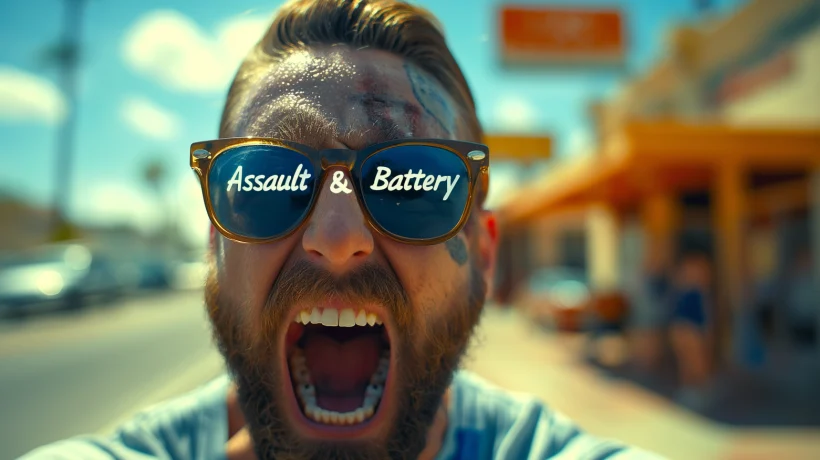
Criminal assault and battery charges in California can lead to severe consequences. Understanding the legal defenses and penalties is crucial to protect your rights and future.
by LawInc Staff
June 20, 2024
Assault and battery are serious crimes in California that can result in hefty fines, jail time, and other life-altering consequences. If you’ve been charged with assault or battery, or believe you may be at risk of charges, it’s crucial to understand the laws, your rights, and how to mount an effective defense.
This ultimate guide explains California’s assault and battery laws in detail, covering elements of the offenses, penalties, legal defenses, and key considerations if you’re facing charges. Learn what the prosecution must prove, how charges are defined and sentenced, and steps to take to protect your future.
From demystifying confusing penal codes to providing real-world examples and expert tips for navigating the legal system, get all the essential information on assault and battery laws in California in one comprehensive resource.
1. Understand the Difference Between Assault and Battery
-
- Assault: An unlawful attempt, coupled with a present ability, to commit a violent injury on another person.
- Battery: Any willful and unlawful use of force or violence upon the person of another.
- Key Difference: Assault doesn’t require actual physical contact, just an attempt. Battery involves actual offensive touching.
- Aggravating Factors: Use of a deadly weapon (ADW), causing great bodily injury (GBI), or assaulting certain protected persons can elevate charges.
- Wobbler Offenses: Many assault/battery crimes are “wobblers,” chargeable as either a felony or misdemeanor based on facts of the case and defendant’s history.
Examples:
-
- Swinging a fist at someone but missing would be an assault. Actually connecting with the punch would be battery.
- Holding a knife and threatening to stab a victim could be considered assault with a deadly weapon. Actually stabbing the victim would be battery with a deadly weapon.
- A bar fight where the victim suffers a concussion or broken bones could be charged as battery causing serious bodily injury.
- Throwing an object at a police officer, even if you miss, would be assault on a peace officer and likely charged as a felony.
- A first-time offender who pushes a stranger during an argument may get misdemeanor charges. A defendant with a rap sheet who inflicts major injuries is more likely facing a felony.
How to Proceed:
-
- Carefully review the specific Penal Code section(s) that you are alleged to have violated to determine if it’s assault and/or battery.
- Note if the police report or charges mention use of weapons, serious injuries, or victims with protected status, as these can increase penalties.
- If you’re arrested, avoid discussing details of the incident until you have an attorney present, as your statements can be used against you.
- As soon as possible, write down everything you remember about the situation – what was said and done, any witnesses or evidence that may support your side.
- Be aware that the prosecutor has discretion in many cases to charge you with a felony or misdemeanor, and your criminal history can influence that decision.
FAQs:
-
- Can I be charged with assault in California even if I never touched anyone? Yes, assault only requires an attempt to inflict force or violence, not actual contact.
- Is self-defense a valid defense to assault or battery charges? Yes, if you reasonably believed force was necessary to protect yourself or others from imminent harm, this can justify your actions.
- What’s the difference between simple and aggravated assault or battery? Aggravated charges involve more extreme factors like serious injuries, deadly weapons, or domestic violence.
- Can words alone constitute an assault? Generally no, unless the words are accompanied by actions demonstrating an immediate ability and intent to carry out violence.
- What’s the statute of limitations for assault/battery in CA? 1 year for misdemeanors, 3 years for felonies in most cases – that’s how long after the incident the prosecutor has to file charges.
2. Know the Penalties for Misdemeanor and Felony Convictions
-
- Misdemeanor Simple Assault: Up to 6 months in county jail, and/or a fine up to $1,000.
- Misdemeanor Battery/Simple Battery: Up to 6 months in county jail, and/or a fine up to $2,000.
- Felony Assault: Up to 4 years in state prison, and/or a fine up to $10,000.
- Felony Battery: 2-4 years in state prison, and/or a fine up to $10,000 (even higher for aggravated battery or battery on protected persons).
- Sentencing Enhancements: Using a gun or assault weapon (Penal Code Section 12022), committing a ‘hate crime’ (Penal Code Section 422.75), or having prior convictions can add years to your sentence.
Examples:
-
- Shoving someone during a heated argument could be charged as misdemeanor simple battery with up to 6 months jail time.
- Sucker punching a stranger at a bar, causing a concussion and broken nose, would likely be felony battery with 2+ years in state prison.
- Pointing a gun at someone and threatening to shoot them could be felony assault with a deadly weapon, risking 4 years imprisonment.
- If charged as a hate crime because the victim was targeted for their race or orientation, the judge can tack on an extra 1-3 years in prison.
- A defendant with a prior violent felony on their record could face a “strike” under California’s Three Strikes Law, rapidly inflating their sentence.
How to Proceed:
-
- Have your defense attorney carefully review the allegations to determine if misdemeanor or felony charges are being pursued.
- Examine the police report, witness statements and other evidence to gauge how provable the charges may be – this can affect plea bargaining.
- Provide your lawyer any mitigating evidence, like proof you acted in self-defense or under duress, to push for reduced charges.
- Discuss with counsel if you have any prior convictions that could inflate your sentencing exposure under “Three Strikes” or other enhancement laws.
- Have a frank conversation about the risks and benefits of accepting a plea deal vs. fighting charges at trial in light of the potential sentences.
FAQs:
-
- Will I automatically go to jail if convicted of assault or battery? Not necessarily – many first-time offenders get probation or alternative sentencing options.
- Can prior convictions be used against me even if they weren’t for assault/battery? Yes, California’s Three Strikes law covers “serious” or “violent” felonies across many categories.
- Do assault and battery charges always end up on your permanent record? Usually yes if convicted, although some first offenders may qualify for diversion programs to earn a dismissal.
- Is probation an option for felony assault or battery convictions? Sometimes, but it’s up to the judge and depends on factors like criminal history and severity of the offense.
- Are anger management classes required after an assault/battery conviction? Very often yes, either as part of probation conditions or to show the court you’re addressing the underlying issues.
3. Be Aware of Collateral Consequences of Convictions
-
- Restitution: The court can order you to pay the victim’s medical bills, property damage, lost wages, counseling costs and more.
- Restraining/Protective Orders: The alleged victim may obtain a court order prohibiting you from contacting them or even coming within a certain distance (especially in domestic violence cases).
- Firearm Rights: A felony conviction will strip your right to own or possess firearms. Many misdemeanor assault/battery convictions also carry 10-year gun bans.
- Employment Obstacles: An assault/battery conviction can make it very difficult to pass background checks for jobs, professional licensing, security clearances, etc.
- Immigration Consequences: Convictions for violent crimes like assault or battery can jeopardize your visa, green card, and ability to obtain citizenship. Non-citizens may even face deportation.
Examples:
-
- After a bar fight conviction, Marcus had to pay the victim $8,000 for a broken jaw, $3,000 for lost wages, and $2,500 for mental health counseling.
- When Jen was convicted of domestic battery, the judge issued a protective order banning her from coming within 100 yards of her ex for 3 years.
- Luke, an avid hunter, had to surrender his firearms to police and lost his right to own guns for 10 years after a felony ADW conviction.
- Sarah struggled to find work as a nurse after her assault conviction, as most hospitals wouldn’t hire her with a violent crime on her record.</
- Javier, a green card holder, was shocked to be placed in removal proceedings after his battery conviction, as his lawyer never warned him it could impact his immigration status.
How to Proceed:
-
- Consult with your attorney about the full range of consequences a conviction in your case could carry – don’t just focus on jail time.
- Gather financial documents, insurance records, pay stubs, etc. to help determine your ability to pay any court-ordered restitution to the victim.
- If you’re a gun owner, discuss with your lawyer how a conviction may impact your firearm rights and what you’d need to do to comply with any bans.
- Be upfront about your job situation and future employment goals, as your attorney may be able to structure a plea to minimize career impact.
- If you’re not a U.S. citizen, consult an immigration attorney ASAP about how an assault/battery case could affect your status – you may need to prioritize deportation avoidance over other concerns.
FAQs:
-
- Can wages be garnished to pay restitution after an assault/battery conviction? Yes, the court can order wage garnishment and other collections efforts if you don’t pay.
- What happens if you violate a restraining order put in place after a conviction? You can be charged with a new crime, usually a misdemeanor, facing up to 1 year in jail and a $1000 fine.
- Can I ever regain my gun rights after an assault or battery conviction? It depends – most misdemeanor bans last 10 years. Felony gun rights are lost permanently unless you later get the conviction expunged.
- Will an employer automatically disqualify me for a job if I have an assault/battery on my record? Not always, but jobs involving vulnerable populations (children, elderly, etc.) or needing security clearances often have strict background standards.
- Are assault or battery considered deportable offenses for non-citizens? Many are, especially aggravated felony or domestic violence offenses. Any assault/battery arrest should be taken very seriously by immigrants.
4. Common Legal Defenses to Assault and Battery Charges
-
- Self-Defense/Defense of Others: You were reasonably acting to protect yourself or another person from imminent threat of harm.
- Lack of Intent: You didn’t intend to attempt or commit violence (e.g. you accidentally bumped into someone in a crowd).
- Consent: The alleged victim actually consented to the contact (e.g. a football player consenting to rough contact during a game).
- Parental Right to Discipline: Parents have a limited right to use corporal punishment to discipline their children, as long as it’s not excessive or abusive.
- Insufficient Evidence: The prosecutor hasn’t proved every element of the alleged offense beyond a reasonable doubt.
Examples:
-
- Alexis was charged with assault for pepper spraying a man, but she has a valid self-defense case as he had followed her to her car at night and reached to grab her.
- Darren’s battery charge for shoving someone at a concert may not stick as video shows it was an accidental bump in a tightly packed crowd.
- When MMA fighters Jake and John got into a brawl at their gym, Jake claimed consent as a defense since they routinely spar together.
- Mei spanked her bratty child in a store, leaving red marks. While this will be investigated by CPS, she has a parental discipline defense if her actions were reasonable.
- Bryan’s felony assault case ended in acquittal when the jury found the state’s evidence too flimsy and circumstantial to prove his guilt beyond a reasonable doubt.
How to Proceed:
-
- Discuss your side of the story in depth with your defense lawyer to explore all possible defenses to the charges.
- Help your attorney gather evidence that may support a defense, like security camera footage, witness statements, photos of your own injuries, etc.
- Be upfront with your lawyer about any pre-existing relationship with the alleged victim that could support a consent defense.
- If accused of domestic violence, provide records showing completion of any past court-ordered abuse intervention classes to support a no intent/accident defense.
- Have your attorney file a motion to dismiss charges if there are strong grounds to argue that one of the legal elements hasn’t been sufficiently proven.
FAQs:
-
- What’s the difference between a legal excuse and justification defense? An excuse defense like provocation argues your blameworthiness should be reduced, while a justification like self-defense argues your actions were lawful.
- Can I claim self-defense if the other person hit me first? You still must prove that the force you used in response was reasonable and not excessive based on the threat you faced.
- Does an accident or lack of intent always negate assault and battery charges? No, some offenses like simple battery can be charged even if intent wasn’t proven, if you still acted willfully.
- How much force can a parent legally use to discipline a child? It depends on factors like the child’s age, size and the form of force, but any force likely to cause injury is crossing the line.
- Can police reports be used as evidence against me if the officer didn’t witness the alleged assault/battery? Hearsay rules may preclude the report itself, but the officer could still potentially testify about statements made.
Summary

Assault and battery are two distinct but related crimes in California. Assault is an attempt to violently injure someone, while battery is the actual use of unlawful force or violence on another. Penalties range from 6 months in jail for simple misdemeanors up to 4 years in prison for aggravated felonies.
Assault and battery charges are serious business in California. A conviction can lead to hefty fines, jail time, loss of gun rights, difficulty finding employment, and even deportation for immigrants. But many viable defenses exist, from self-defense to lack of intent to insufficient evidence.
If you’re facing assault or battery charges in California, the most important thing you can do is consult with an experienced criminal defense attorney. They can evaluate the strength of the evidence, devise the best strategy for your unique circumstances, and protect your rights throughout the legal process.
Don’t let one mistake define the rest of your life. Educate yourself on the law, work closely with your lawyer, and fight for the best possible outcome in your case. With the right approach, you may be able to avoid or minimize the life-altering consequences of an assault or battery conviction.
Charged with Assault or Battery? Get a Free Legal Consultation
If you or a loved one has been arrested for assault or battery in California, time is of the essence. You need an aggressive defense lawyer on your side immediately to start building your case and protecting your future.

Facing assault or battery charges in California? Contact us to be connected with an experienced criminal defense attorney.
Most criminal attorneys offer free consultations to discuss your assault or battery case, explain your legal options, and help you choose the best path forward. Don’t face the prosecutor alone. Assert your right to legal counsel and get the justice you deserve.
Assault & Battery Law Quiz
Multiple Choice Questions:
-
- 1. What is the key difference between assault and battery in California?
- A) Assault is a felony, battery is a misdemeanor
- B) Assault requires physical contact, battery does not
- C) Assault is an attempted battery, battery is the actual use of force
- D) There is no difference, the terms are interchangeable
- 2. What is the maximum jail sentence for misdemeanor simple battery in California?
- A) 30 days
- B) 6 months
- C) 1 year
- D) 3 years
- 3. A felony assault conviction in California can result in loss of gun rights for how long?
- A) 1 year
- B) 5 years
- C) 10 years
- D) Life
- 4. Which of the following is NOT a common defense to assault or battery charges?
- A) Mistaken identity
- B) Self-defense
- C) Consent
- D) Lack of intent
- 5. Can a parental right to discipline a child be a defense to assault or battery charges?
- A) Yes, as long as the force used wasn’t excessive
- B) Only if the child is under 12
- C) Only if no physical contact occurred
- D) No, parents have no right to use force on children
- 1. What is the key difference between assault and battery in California?
Answers:
-
- 1. C) Assault is an attempted battery, meaning no physical contact is required. Battery is the unlawful use of force or violence on someone else.
- 2. B) Misdemeanor simple battery carries a maximum sentence of 6 months in county jail in California.
- 3. D) In most cases, a felony assault conviction involving violence will result in a lifetime ban on owning or possessing firearms.
- 4. A) Mistaken identity (arguing the wrong person was charged) is not itself a legal defense to assault or battery. The other options, self-defense, consent, and lack of intent, can all potentially be valid defenses.
- 5. A) Parents do have a limited right to use physical discipline on their children, but only to the extent the force was reasonable and not excessive given the child’s age, size, and the misbehavior being corrected.
Disclaimer
This article is intended to provide general information about California assault and battery laws and potential defenses. It does not constitute formal legal advice and should not be construed as establishing an attorney-client relationship.
Laws and interpretations are always evolving, and the application to a specific case will depend heavily on the unique facts and circumstances. If you are facing assault or battery charges, you should consult a qualified criminal defense attorney licensed in your jurisdiction to obtain tailored legal guidance for your situation.
The author and publisher disclaim any liability for improper use of the information provided in this article. Use of this material does not guarantee any particular outcome for your case. Assault and battery allegations are serious criminal matters that require prompt attention from an experienced lawyer to protect your rights and freedom.
Also See
YouTuber Arrested and Facing up to 10 Years in Prison for Helicopter Fireworks Stunt









